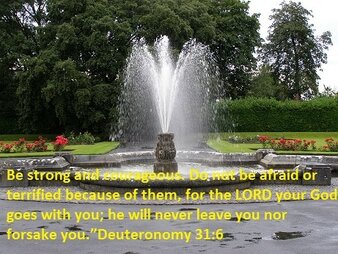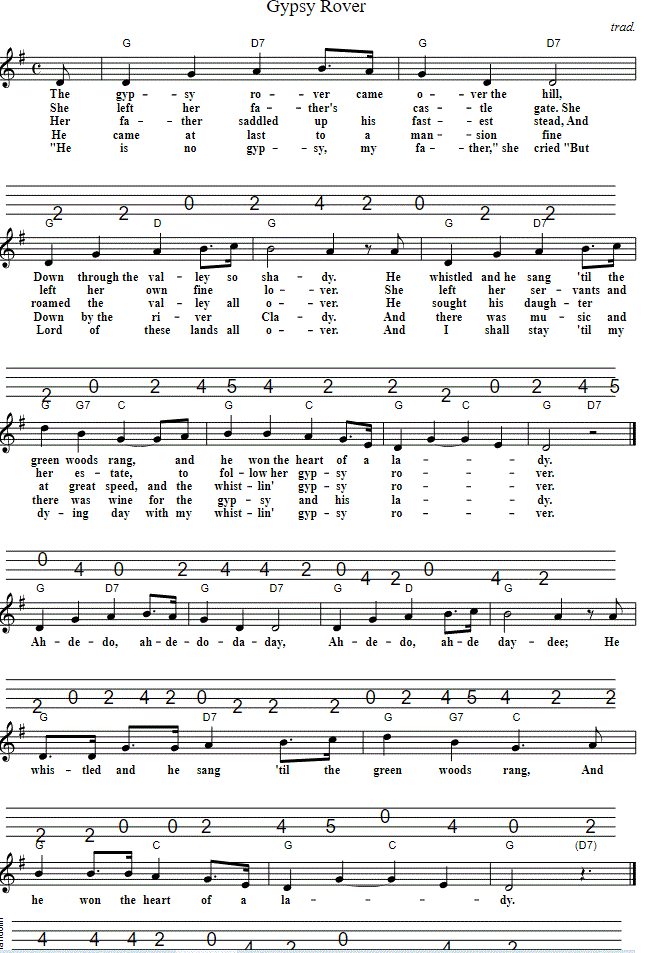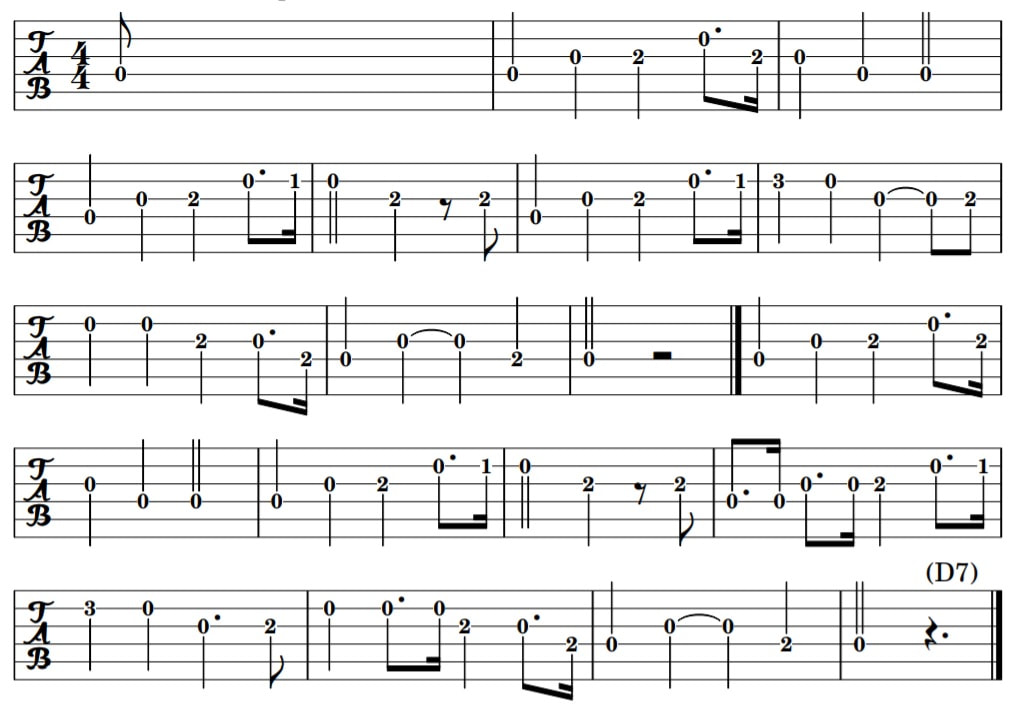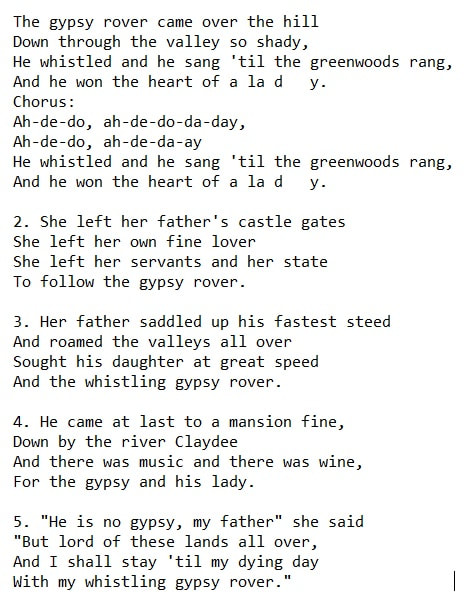The Whistling Gypsy Rover lyrics and chords
The easy guitar chords are written in chordpro and the 5 string banjo chords are included for the key of G Major plus the guitar tab.The song was written by Leo Maguire who also wrote one of the many Kevin Barry Songs. The gypsy rover was recorded by The Fureys And Davie Arthur also by The Clancys And Tommy Makem plus Foster And Allen. I have included a set of chords to suit the youtube version by The Clancys in the key of D. The Gypsy Rover Sheet Music is also included here on this site and suitable for learning on the tin whistle. The Clancy Brothers Song Lyrics List . Tenor mandola / guitar tab in CGDA included.
The Gypsy Rover Song Lyrics With Easy Guitar Chords In G Major.
[G]The gypsy[D7] rover came[G] over the[D7] hill
[G]Down through the[D7] valley so[G] sha[D7]dy,
He[G] whistled and he[D7] sang 'til the[Bm] greenwoods[Em] rang,
And[G] he won the[D7] heart of a[G] la[D7]d[G]y.
Chorus:
[G]Ah-de-[D7]do, ah-de-[G]do-da-[D7]day,
[G]Ah-de-[D7]do, ah-de-[G]da-[D7]ay
He[G] whistled and he[D7] sang 'til the[Bm] greenwoods[Em] rang,
And[G] he won the[D7] heart of a[G] la[D7]d[G]y.
2. She left her father's castle gates
She left her own fine lover
She left her servants and her state
To follow the gypsy rover.
3. Her father saddled up his fastest steed
And roamed the valleys all over
Sought his daughter at great speed
And the whistling gypsy rover.
4. He came at last to a mansion fine,
Down by the river Claydee
And there was music and there was wine,
For the gypsy and his lady.
5. "He is no gypsy, my father" she said
"But lord of these lands all over,
And I shall stay 'til my dying day
With my whistling gypsy rover."
Irish songs from G-J
[G]The gypsy[D7] rover came[G] over the[D7] hill
[G]Down through the[D7] valley so[G] sha[D7]dy,
He[G] whistled and he[D7] sang 'til the[Bm] greenwoods[Em] rang,
And[G] he won the[D7] heart of a[G] la[D7]d[G]y.
Chorus:
[G]Ah-de-[D7]do, ah-de-[G]do-da-[D7]day,
[G]Ah-de-[D7]do, ah-de-[G]da-[D7]ay
He[G] whistled and he[D7] sang 'til the[Bm] greenwoods[Em] rang,
And[G] he won the[D7] heart of a[G] la[D7]d[G]y.
2. She left her father's castle gates
She left her own fine lover
She left her servants and her state
To follow the gypsy rover.
3. Her father saddled up his fastest steed
And roamed the valleys all over
Sought his daughter at great speed
And the whistling gypsy rover.
4. He came at last to a mansion fine,
Down by the river Claydee
And there was music and there was wine,
For the gypsy and his lady.
5. "He is no gypsy, my father" she said
"But lord of these lands all over,
And I shall stay 'til my dying day
With my whistling gypsy rover."
Irish songs from G-J
The gypsy rover tenor guitar / mandola tab in CGDA tuning
The gypsy rover 5 string banjo chords for the key of G [ Personally I don't play Bm chords and instead just play a D ]
The Whistling Gypsy Rover chords in D Major
The [D]gypsy[A] rover came[D] over the[A] hill
[D]Down through the[A] valley so[D] sha[A]dy,
He[D] whistled and he[A] sang 'til the[D] greenwoods[Bm] rang,
And[D] he won the[A] heart of a[G] la[D7]d[D]y[A].
Chorus:
[D]Ah-de-[A]do, ah-de-[D]do-da-[A]day,
[A]Ah-de-[D]do, ah-de-da-[A]ay
He[D] whistled and he[A] sang 'til the[F#m] greenwoods[D] rang,
And he won the[G] heart of a la d[D]y.
The [D]gypsy[A] rover came[D] over the[A] hill
[D]Down through the[A] valley so[D] sha[A]dy,
He[D] whistled and he[A] sang 'til the[D] greenwoods[Bm] rang,
And[D] he won the[A] heart of a[G] la[D7]d[D]y[A].
Chorus:
[D]Ah-de-[A]do, ah-de-[D]do-da-[A]day,
[A]Ah-de-[D]do, ah-de-da-[A]ay
He[D] whistled and he[A] sang 'til the[F#m] greenwoods[D] rang,
And he won the[G] heart of a la d[D]y.
Below is the ebook list of Irish Folk Songs with guitar chords
in 3 keys. Price €8.90 and I'll email the ebook after purchase .
The chords are suited to ukulele, banjo or mandolin also.
Martin
in 3 keys. Price €8.90 and I'll email the ebook after purchase .
The chords are suited to ukulele, banjo or mandolin also.
Martin
The Gypsy Rover is a traditional Irish folk song that has captivated audiences for centuries. With its catchy tune and romantic lyrics, this song has become a staple in the folk music genre. Its popularity has led to numerous covers and adaptations, making it a timeless classic. But what is it about this song that has made it stand the test of time? In this thesis, we will explore the origins, meaning, and impact of The Gypsy Rover song.
The Gypsy Rover, also known as The Whistling Gypsy , has a long and rich history. It is believed to have originated in Ireland in the 19th century, but its roots can be traced back even further. The song is said to have been based on a Scottish ballad called 'The Gypsy Laddie', which dates back to the 17th century. Over the years, the lyrics and melody of The Gypsy Rover have been altered and adapted by different artists, but its essence remains the same.
The lyrics of the song tell the story of a young woman who falls in love with a dashing gypsy rover. Despite the objections of her family and society, she chooses to run away with him, abandoning her comfortable life for a nomadic one. The song romanticizes the idea of a free-spirited lifestyle, as well as the idea of defying societal norms for love. This theme of forbidden love and rebellion against social expectations has resonated with audiences throughout the years and has contributed to the song's enduring popularity.
One of the most captivating aspects of The Gypsy Rover is its melody. The tune is simple but catchy, and the chorus is easy to sing along to. This has made the song a favorite among musicians and has led to countless covers and adaptations. In fact, The Gypsy Rover has been recorded by over 100 artists, including The Clancy Brothers, The Dubliners, and The Corrs. Its popularity has also spread beyond Ireland, with versions in different languages, such as Spanish, German, and French.
The Gypsy Rover has also had a significant impact on popular culture. It has been featured in numerous films, TV shows, and theatrical productions. One of the most notable uses of the song was in the 1952 film 'The Quiet Man', starring John Wayne and Maureen O'Hara. The scene where O'Hara's character sings The Gypsy Rover while dancing with Wayne has become iconic and has further solidified the song's place in popular culture.
Furthermore, The Gypsy Rover has also been used as a symbol of Irish identity and heritage. As an Irish folk song, it represents the country's rich musical traditions and has become a staple in Irish cultural events and celebrations. Its use in films and TV shows set in Ireland has also contributed to its association with the country's culture and history.
In conclusion, The Gypsy Rover is a timeless classic that has stood the test of time. Its origins in Irish and Scottish folk traditions, romantic and rebellious lyrics, and catchy melody have made it a beloved song for generations. Its impact on popular culture and representation of Irish heritage have cemented its place as one of the most iconic songs in folk music history. Whether sung around a campfire or played on stage, The Gypsy Rover will continue to enchant audiences for years to come.
The Gypsy Rover, also known as The Whistling Gypsy , has a long and rich history. It is believed to have originated in Ireland in the 19th century, but its roots can be traced back even further. The song is said to have been based on a Scottish ballad called 'The Gypsy Laddie', which dates back to the 17th century. Over the years, the lyrics and melody of The Gypsy Rover have been altered and adapted by different artists, but its essence remains the same.
The lyrics of the song tell the story of a young woman who falls in love with a dashing gypsy rover. Despite the objections of her family and society, she chooses to run away with him, abandoning her comfortable life for a nomadic one. The song romanticizes the idea of a free-spirited lifestyle, as well as the idea of defying societal norms for love. This theme of forbidden love and rebellion against social expectations has resonated with audiences throughout the years and has contributed to the song's enduring popularity.
One of the most captivating aspects of The Gypsy Rover is its melody. The tune is simple but catchy, and the chorus is easy to sing along to. This has made the song a favorite among musicians and has led to countless covers and adaptations. In fact, The Gypsy Rover has been recorded by over 100 artists, including The Clancy Brothers, The Dubliners, and The Corrs. Its popularity has also spread beyond Ireland, with versions in different languages, such as Spanish, German, and French.
The Gypsy Rover has also had a significant impact on popular culture. It has been featured in numerous films, TV shows, and theatrical productions. One of the most notable uses of the song was in the 1952 film 'The Quiet Man', starring John Wayne and Maureen O'Hara. The scene where O'Hara's character sings The Gypsy Rover while dancing with Wayne has become iconic and has further solidified the song's place in popular culture.
Furthermore, The Gypsy Rover has also been used as a symbol of Irish identity and heritage. As an Irish folk song, it represents the country's rich musical traditions and has become a staple in Irish cultural events and celebrations. Its use in films and TV shows set in Ireland has also contributed to its association with the country's culture and history.
In conclusion, The Gypsy Rover is a timeless classic that has stood the test of time. Its origins in Irish and Scottish folk traditions, romantic and rebellious lyrics, and catchy melody have made it a beloved song for generations. Its impact on popular culture and representation of Irish heritage have cemented its place as one of the most iconic songs in folk music history. Whether sung around a campfire or played on stage, The Gypsy Rover will continue to enchant audiences for years to come.






